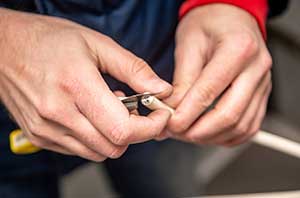 In Nevada, it is illegal to engage in fraudulent activity. Title 15 is the part of Nevada law that outlines criminal conduct and that establishes the penalties for different kinds of wrongful behavior committed within the state. It is important to understand the definition of a crime you have been accused of, as well as to determine what possible penalties you could be facing under Title 15 if you were convicted of the crime.
In Nevada, it is illegal to engage in fraudulent activity. Title 15 is the part of Nevada law that outlines criminal conduct and that establishes the penalties for different kinds of wrongful behavior committed within the state. It is important to understand the definition of a crime you have been accused of, as well as to determine what possible penalties you could be facing under Title 15 if you were convicted of the crime.
There are many technical legal terms used within Title 15 to establish what prosecutors must prove for defendants to be found guilty of various crimes. One of the terms that you will see in various places throughout Title 15 is intent to defraud. If the prosecutor proves intent to defraud, this could potentially result in your conviction and lead to penalties that are life-changing. It’s thus essential to know exactly what intent to defraud means under the law.
The meaning of intent to defraud is explained in Chapter 193, which is the general provisions chapter of Title 15. The explanation found in N.R.S. 193.040 of intent to defraud is applicable throughout Title 15, so you should make certain you have carefully reviewed this statute. Because understanding legal terms is difficult, as is navigating the entire Nevada criminal code, it’s advisable to reach out to criminal defense lawyers in Las Vegas for help.
LV Criminal Defense will assist you in understanding intent to defraud, in determining if prosecutors can prove intent to defraud, and in making it difficult or impossible for prosecutors to meet their burden of proof. To find out more about the ways in which our skilled Nevada defense firm can help you to fight charges involving intent to defraud, give us a call today.
According to N.R.S. 193.040, whenever “intent to defraud” is made an element of a crime outlined in Title 15, a prosecutor can successfully prove intent by showing that you meant to defraud a person, an association, a corporation, a body politic or any other entity.
In other words, if you are accused of a fraud crime and intent to defraud is a required element of a crime, all a prosecutor has to do is show you tried to defraud some person, organization or group. N.R.S. 193.040 makes it clear that a prosecutor is not required to show you attempted to defraud any one particular person.
Nick Wooldridge has a long track record of representing clients accused of serious federal and state crimes in Nevada.
For example, N.R.S. 205.132 indicates that if you issue a check or a draft without sufficient money or credit, there is a presumption of intent to defraud. If a prosecutor wished to prove you committed the crime of issuing a check without having the funds to cover it, the prosecutor wouldn’t have to show you tried to defraud any specific person. They would just have to show that your actions in passing the bad check were an intent to defraud someone.
You must take fraud charges very seriously, as you could end up in prison and with a damaged reputation if you are found guilty of various fraud offenses. As soon as you come under investigation for any kind of fraudulent behavior, you should reach out to a defense attorney in Nevada.
LV Criminal Defense is here to fight for you. We will guide you through the process of raising defenses or negotiating a plea deal, depending upon which trial strategy is the most likely to result in minimal penalties. To find out more about the ways in which our experienced Las Vegas defense lawyers can help you, give us a call today.
When I initially met with Mr. Wooldridge, he took the opportunity to sit and go over my problem with me. He described details in my case which he found disturbing and explained why he I should have him on my side.